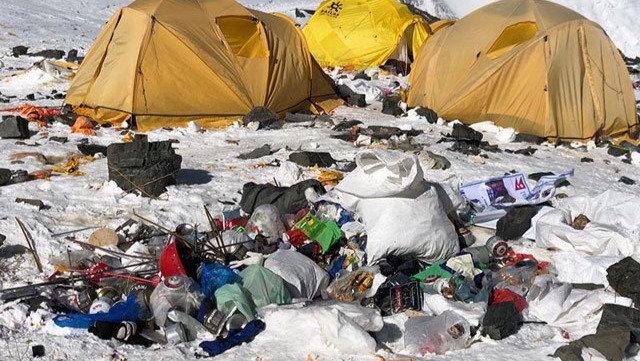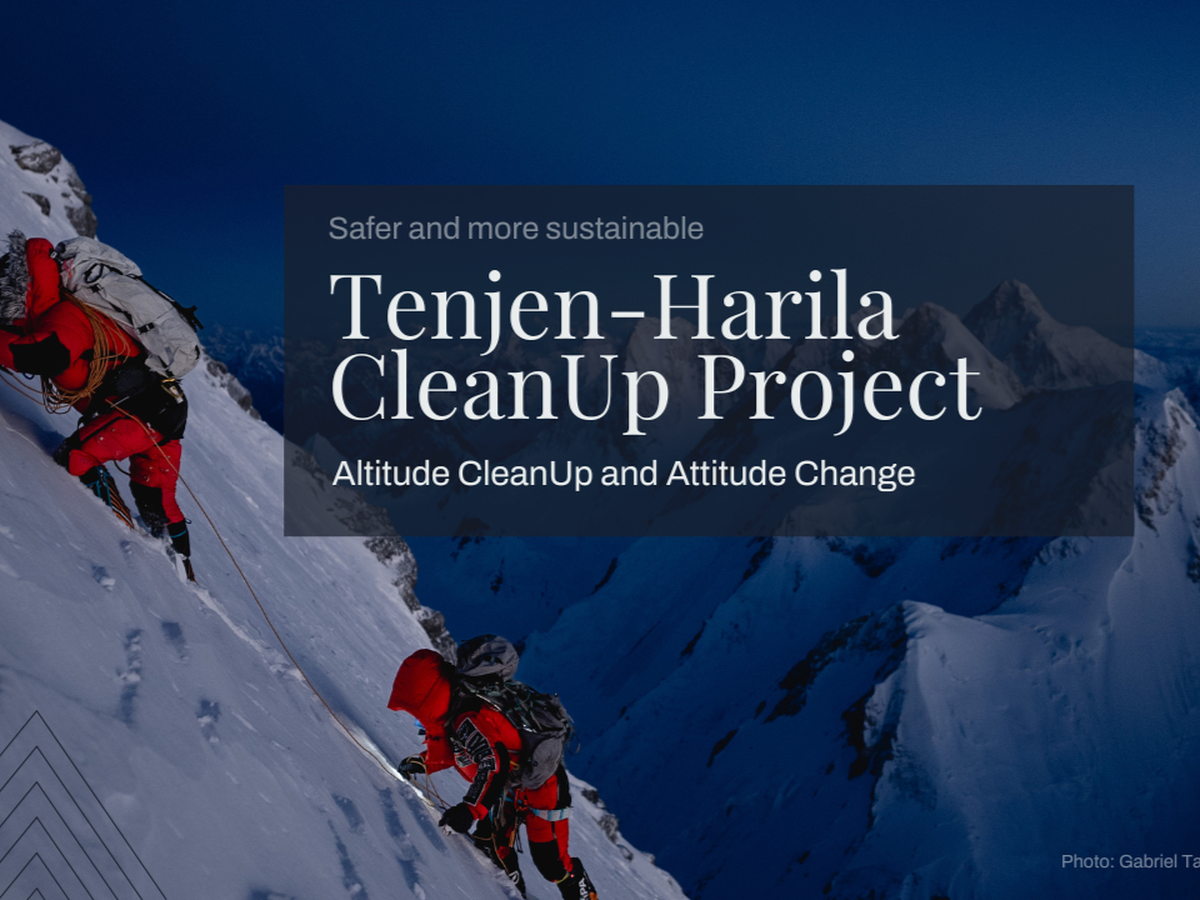- J
When I was climbing with Lama, and we set the world record in 2023, we often discussed the waste we saw in the mountains. Our plan all the way was to start a cleanup project, beginning with Mount Everest.
As many might know, Lama passed away in an avalanche in October 2023. I have decided to run this project in his name ❤️
There is too much waste in the mountains, and it is increasing every year
Waste is piling up in the mountains. Living conditions for the people who live off and work on the mountains, deteriorates with every climbing season. Not to mention the enormous negative impact the waste has on wildlife and nature. In addition, the world’s impression of the Himalayas is that it is a hopeless waste bin, giving a bad image to Nepal and the region.
As the number of people wanting to climb the mountains increase, the problem intensifies. I firmly believe that it is our shared responsibility to take action on how we climb these mountains.

The above photo was taken by David Liano Gonzalez in 2018 and shared in the article here .
Why is waste piling up?
Many people ask me why climbers and sherpas can't just bring everything with them back down. While this sounds easy, it is not always the case.
When you are climbing Mount Everest, even while trekking into basecamp, you are often extremely tired. You feel like you are slowly suffocating. Everything is difficult – breathing, walking, going to the toilet, even sleeping feels tiring. Your body and your mind are only focusing on maintaining your vital body functions.
If you have managed to summit Everest and you are on the way down, you only think about that – namely to come down to basecamp, safe and sound. The lack of oxygen can mess with your brain. You can simply forget to bring your trash down.
In addition, if the weather is bad, there might not be time to go fetch your trash, that can be buried under snow by the time you get back from the top.
This is why it is important to think about the trash as not YOUR trash or MY trash, but OUR TRASH. We are all responsible for taking care of the mountain. If one person can’t, another one can!
We need to remove what has piled up and prevent new waste from cluttering down the mountain
The overall objective of the project is to clean up the high altitude mountains, starting with Mount Everest. And, at the same time educate for an attitude change.
1) We need a dedicated team to clean up
Instead of relying on climbers and Sherpas already present on the mountains, I intend to hire a dedicated team of skilled Sherpas, with the sole focus on cleaning up trash. When we do this, we also make sure that the job is to remove trash, not to guide people. In addition, if we constantly have experienced and skilled sherpas in Camp 4, they can assist others on the mountain, if needed.
2) We need to think long term
Through education, communication, fees and sale of recycled items, I want to have an organisation that will be capable of running effective cleanups every year.
3) We need support from local stakeholders
I have buy-in and approval from the government and I am co-operating with the local trekking companies in the region.
The Tenjen-Harila CleanUp Project's key features
In order to effectively remove all the trash, I have laid out a plan for the project. Summed up below:
We will hire a dedicated team
I intend to hire a highly trained, dedicated team, that will only focus on waste removal, not on guiding clients. In order to do this, I need to hire the best Sherpas in the region, the most professional and skilled ones, with safe and attractive working conditions:
- Minimise passages across dangerous parts of the mountain (e.g. Khumbu Icefall)
- Attractive Salary
- Professional Insurance
- Quality Equipment (downsuits, helmets, oxygen)
- A work-rotation system to be set up to allow for ample rest and restoration in between shifts
We will run training and education
The waste-culture in the mountains needs to change, from within. Both workers and visitors need information and training in order to make this change, so that all people on the mountain understand their own responsibility to reduce their waste footprint.
High Altitude Waste Management Course
I am working on a mandatory course for everyone that is working on and visiting the mountain (online for clients, offline and localised for workers).
Basecamp Waste Information Tent
I want to set up a tent in basecamp where people can come learn about how they can take responsibility towards our common waste problem.
We want to be self-sustained in 5 years
This project is aiming to create a self-sustained system after 5 years of operation.
The intended revenue sources after 5 years:
- A Fee, similar to the Fixing Team Fee, paid by climbers to expedition companies
- Course material and exam fee bought by climbers
- Sale of recycled products and art made of waste
- Possibility for other companies/sponsors to participate, if terms of exclusivity are met
We will inform the world of what we achieve
The Tenjen-Harila CleanUp Project will hold a strong PR plan, with the aim of reaching out to an international audience. A website, social media channels and press coverage are already being planned.
We will co-operate with research and development partners
The project aims to co-operate with research and development teams to continuously improve on methods, equipment and tools:
- Measure and weigh all trash found and brought down
- Drone research for rescue missions
- Research for repurposing the trash found in the mountains
- New ways of making mountaineering more sustainable
This project is costly and will take years
Yes, the Tenjen-Harila Cleanup is very costly. It is because I want to do it properly. Also, I estimate it will take years to clean up Mount Everest, maybe 5-10 years. It will depend on the resources, the weather and the overall conditions of the mountain.
We will make it!
I am positive we will make it, we will make Mount Everest Clean for generations to come!

